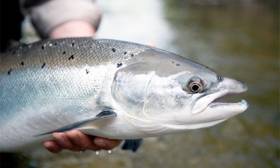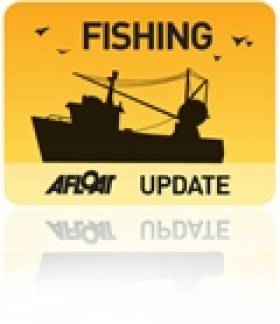Displaying items by tag: NASCO
#Fishing - Sean Kyne TD, Minister with responsibility for the inland fisheries sector, today (Thursday 21 June) welcomed the positive outcome from the international discussions at the North Atlantic Salmon Conservation Organisation (NASCO) annual meeting in Portland, Maine, USA.
“Our departmental officials and those of Inland Fisheries Ireland represented Ireland at the negotiations as part of the EU delegation,” Minister Kyne said. “They joined delegates from the EU, USA, Canada, Norway, the Russian Federation, Greenland and the Faroes.
“The outcome of the week-long discussions is that, for the period 2019-2022, no harvest fishery will take place off the Faroe Islands and the restrictions on the fishery off West Greenland have been strengthened.
“I am pleased that these two important regulatory measures were agreed in a spirit of international c-ooperation.”
Minister Kyne emphasised the importance of these measures for Irish salmon migrating to distant feeding grounds before returning to their natal rivers in adulthood to spawn.
“The migratory stock complex travelling through Faroese waters comprises a majority component of European river stocks, including those from Ireland, and the measure to have no commercial fishing in these waters is important for these vulnerable stocks,” he said.
“I am particularly pleased that the discussions on the Faroes area were chaired by Ireland, on behalf of the EU.”
The majority component of the stock complex migrating to Greenlandic waters originates from the North American continent, and the restriction on fishing in this area assists these stocks as well as the smaller European component.
The agreed level of potential catch, for the internal use fishery in Greenland, is reduced by some 33% over the quota set in each of the last three years. Agreement was also reached on increased monitoring and control of the fishery.
The NASCO meeting also considered the factors that affect the marine survival of Atlantic salmon, with scientists, including those from IFI, engaged in cutting edge work to identify and address those causes.
Determining why salmon are dying at sea before they can come back to their natal rivers to spawn is a key research priority.
A new innovative approach to oceanic long range acoustic monitoring, ‘ROAM’ (RAFOS Ocean Acoustic Monitoring), will allow salmon to be tracked through the marine environment. The approach is intended to overcome many of the significant challenges associated with tracking Atlantic salmon throughout their extensive marine migration.
Minister Kyne concluded that the measures taken in Ireland, over a decade ago, to protect migratory salmon stocks have pointed the way internationally and the latest agreements at NASCO demonstrate restraints on exploiting Irish and other stocks as they migrate outside our waters.
Drogheda Hosts North Atlantic Salmon Conference
#Fishing - Drogheda is hosting the 30th annual meeting of the North Atlantic Salmon Conservation Organisation (NASCO) this week till Friday 7 June.
The prestigious fisheries conference will take place in the Westcourt Hotel and will be attended by delegates from Canada, Denmark (in respect of the Faroe Islands and Greenland), the European Union (representing its 27 member states), Norway, Russia and the USA.
Welcoming the conference to Drogheda on Tuesday 4 June, Minister Fergus O’Dowd said it "will continue the key work of NASCO, using the best scientific information, and international co-operation to conserve and manage Atlantic salmon populations.
"I wish the many delegates a friendly and intellectually stimulating stay in Drogheda where the meeting programme will no doubt provide insights and an outstanding platform for dynamic networking to ensure the continued conservation of our precious salmon stocks."
Based in Edinburgh, NASCO is an international organisation established by an intergovernmental convention in 1984. Its main function is to conserve, restore, enhance and rationally manage Atlantic salmon through international cooperation taking account of the best available scientific information.
NASCO is the only intergovernmental organisation with this mandate, which it implements through international consultation, negotiation and co-operation.
Ireland is at the forefront of salmon conservation internationally, according to Inland Fisheries Ireland, which adds that Irish participants at the conference include a Government delegation of managers and scientists and representatives of a number of Irish-based NGOs, including Salmon Watch Ireland.
The cross-border Loughs Agency, which has responsibility for salmon conservation and protection Foyle and Carlingford Loughs, will also be represented as part of the Irish delegation.

























































